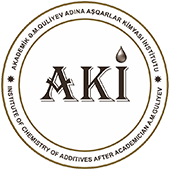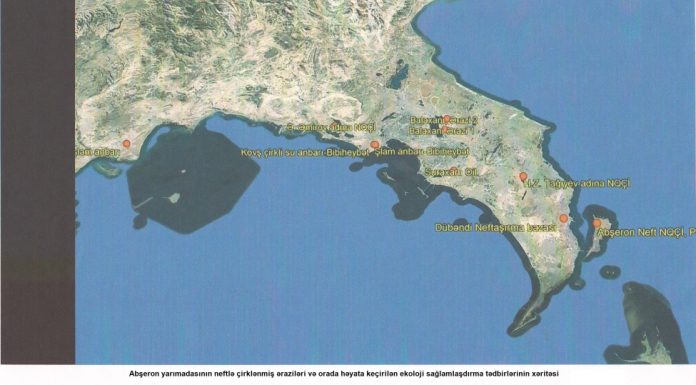THE INSTITUTE OF CHEMISTRY OF ADDITIVES ALWAYS GIVES PREFERENCE TO SCIENTIFIC ACTIVITIES DIRECTED TO SOLVING ENVIRONMENTAL PROBLEMS
Another important event will be held in Baku on November 11-24 this year. We are talking about COP29, which is called the “Conference of the Parties” and will be held for the 29th time. The event is considered a historic meeting aimed at accelerating climate action and achieving the goals of the Paris Agreement. The goal of COP activities is to make progress in limiting global carbon dioxide levels to 1.5 degrees Celsius, as required by the Paris Agreement. COP29 is also seen as an opportunity for participating countries to make new commitments and take concrete steps to address the climate crisis.
Since Azerbaijan is a rich oil and gas country, its oil and gas production, oil and gas refining, petrochemical and chemical industries in general have always required special attention to environmental problems in the country. However, during the Soviet period, the leadership of the former USSR carried out oil production based on technologies that were completely useless in this area and pursued a policy of complete extraction and depletion of the “black gold” that Azerbaijan has. This deliberate policy has not only depleted our underground resources, but has also damaged our country’s ecological environment, created an environmental crisis in oil-polluted areas, and seriously jeopardized the health of the people working there.
After national leader Heydar Aliyev came to power, thanks to his determination and will, a major turn began in the direction of restoration, modernization of the petrochemical industry of Azerbaijan and solving environmental problems.
During the years of independence, one of the main requirements for foreign and local companies investing in these industries was to allocate a certain part of the income to the implementation of environmental projects in order to minimize the impact on the environment. The declaration of 2024 as Green World Solidarity Year in the country by the Decree of the President of Azerbaijan, Mr. Ilham Aliyev, is a natural result of the great sensitivity of the country’s leadership to the issue of environmental safety.
The Cabinet of Ministers is preparing and implementing a plan for various measures to ensure the environmental safety of our country. Research institutes also play a certain role in the timely and efficient implementation of the tasks provided for by these plans. One of such institutions is the Academician Ali Guliyev Institute of Chemistry of Additives (ICA) of the Ministry of Science and Education of the Republic of Azerbaijan. Since its establishment, the institute has always given priority in its scientific research to scientific projects aimed at solving environmental problems. The topics of scientific research aimed at solving environmental problems of the institute can be characterized as follows.
As is known, the main part of petroleum products consists of motor and heating fuels. When these fuels are burned in engines, hydroelectric power plants, and industrial plants, toxic gases such as carbon dioxide, carbon monoxide, light hydrocarbons, sulfur and nitrogen oxides are released into the atmosphere. When any engine (especially diesel fuel) operates, soot particles and significant amounts of carcinogenic compounds, derivatives of aromatic compounds (benzopyrene, etc.) are released into the atmosphere along with these gases. Currently, in most countries around the world, diesel engines have emission criteria for a number of pollutants.
According to research from the Institute of Lung Health at the University of Leicester in the UK and medical centers in other countries, soot particles from transport engines accumulate in the lungs of people, especially young children, and lead to serious complications. To solve this global problem, an effective anti-smoke additive for diesel fuel was created to reduce air pollution by smoke, which is the main toxic component of diesel engine exhaust gases. Thus, the developed additive ИХП-706 sharply reduces the amount of smoke and carcinogenic substances in the gases released during the operation of diesel engines, and is the first anti-smoke additive for diesel fuel not only in our country, but also in the world. This additive was obtained in the Fuel Compositions laboratory on the available and cheap raw materials. The process of its production was quite simple in terms of technological and technical design and could easily be implemented on an industrial scale. This anti-smoke additive, added to the fuel in a concentration of 0.2-0.5% by weight, depending on the type of diesel engine, ensured a reduction in the smoke emitted by it by 60-90%.
The anti-smoke additive developed at ICA was successfully tested in diesel engines of various equipment not only in our country, but also in leading scientific centers and factories in many republics of the former USSR and gave positive results.
The anti-smoke additive for diesel fuel developed at ICA is successfully used in large self-unloading trucks at the quarries of the Kursk Magnetic Anomaly of the Russian Federation, boats of the Moscow Shipping Enterprise “Moscow River” and large buses of the Ministry of Transport “Ikarus” of Azerbaijan and other organizations. The use of the recommended anti-smoke additive is especially effective when operating powerful diesel equipment in mines, quarries and other facilities. The proposed anti-smoke additive has also received patents from the Russian Federation and the Republic of Azerbaijan.
One of the scientific projects which became a great contribution to the environmental safety of our country was associated with the creation of technology for the regeneration of used motor oils and the creation of lubricant compositions for various purposes based on the regeneration product.
As you know, the rapid expansion of the fleet of cars and other equipment in our country every year, as well as the disposal of used lubricants, creates environmental tension, polluting the environment. Therefore, one of the main tasks facing modern petrochemical science has long been to minimize this damage. From this point of view, in order to minimize the burden on the environment, it was necessary to improve the quality of lubricating oils using special additives, increase their service life, and regenerate and reuse used oils.
To this end, several years ago, scientific research was carried out at ICA in the direction of reusing waste lubricants that created environmental stress, and a new regeneration method ( a technological process that ensures the reuse of used oils) was developed. Based on the obtained products, an analogue of commercial oil with additives was created and it was found that the regenerated oils could be used as a base oil in the creation of motor oils for various purposes.
For information, we also note that the “Pilot Plant” was built as part of the scientific project “Creation of technology for the regeneration of used oils using local bentonites and the processing of lubricants based on reclaimed oil”, carried out in 2014-2015. In 2019, lubricants provided by Azerenergy were regenerated by ICA. Since this was a new scientific approach, the research work was patented as “Confidential”.
Cleaning oil-contaminated soils and water using microbiological means is also one of the main fundamental and applied scientific works of ICA aimed at eliminating environmental problems. From this point of view, the leading scientists of the institute have created a modern technology for the production of biological preparations, which are associations of selected microorganisms (bacteria and yeast) with a complex of soil-improving additives for treating soils with different hydrocarbon contents around the Surakhany, Balakhany, Binagadi and Bibi-Heybat fields on the Absheron Peninsula. With the help of this technology, called bioremediation of oil-contaminated soils, an effective association of bacteria and yeast was developed using active hydrocarbon-oxidizing microorganisms isolated from soils located on the territory of these fields, on the basis of which 4 different biological products were created. Biological products were developed and tested for the remediation of oil-contaminated soils and one of them (“Universal”) was recommended for these fields.
At the same time, preventing oil pollution is very relevant in our time for Azerbaijan, where oil is the main part of its economy. As a result of pollution on the territory of the republic, the process of degradation of fertile soils occurs, their biological activity decreases, and erosion processes intensify. Phytoremediation, based on the use of the joint metabolic potential of microorganisms and plants, occupies a special place among biological methods that are economically and environmentally effective in cleaning up oil pollution. Taking this factor into account, ICA scientists have developed a rational phytoremediation technology that takes into account the ecological and climatic conditions of Azerbaijan and ensures the joint influence of plants and microorganisms-destructors for the restoration and fertilization of oil-contaminated soils.
One of the latest successful applied scientific works of ICA, aimed at solving environmental problems, is associated with the creation of a processing process and the use of the processed product “acid resin”, which has accumulated thousands of tons in the area of the city of Balakhany and creates an environmental problem. The problematic aspect of the issue is that the acidic resin formed as a result of the activities of the Baku Oil Refinery over many years, thousands of tons fell into the territory of the Balakhani village of Absheron and created extreme environmental tension.
Look at the contrast of history: for the first time in the world, in 1847, the dark days of Balakhany began with the first oil wells drilled on its territory, and the village became a place where environmental problems reached crisis levels. However, recently, large and medium-sized environmental projects implemented one after another have brought pleasant development to the village. In these processes, the role of ICA scientists was to create an additive that improves the viscosity and low-temperature properties of oil-based fossil fuels, using the product of acid tar, which has a major role in causing disasters in the area. By processing the acid resin and using the processed product, both an important technical and important environmental problem are solved. The acid resin processing product has already been applied. This includes both the economic development of the country and solving environmental problems. This applied scientific achievement is patented.
As can be seen from the above, although ICA is a research institute specializing in the petroleum industry, important aspects of its activities are focused on creating a scientific basis for eliminating environmental problems caused by this industry and its successful application. Of course, more attention will be paid to these issues, and multifaceted activities will expand. Because COP29, which will be held in our country, will pose new challenges for our research institutes, as well as for chemical scientists. Solving these problems will bring economic development to our republic, as well as environmental safety, which will serve as an example for other countries.


